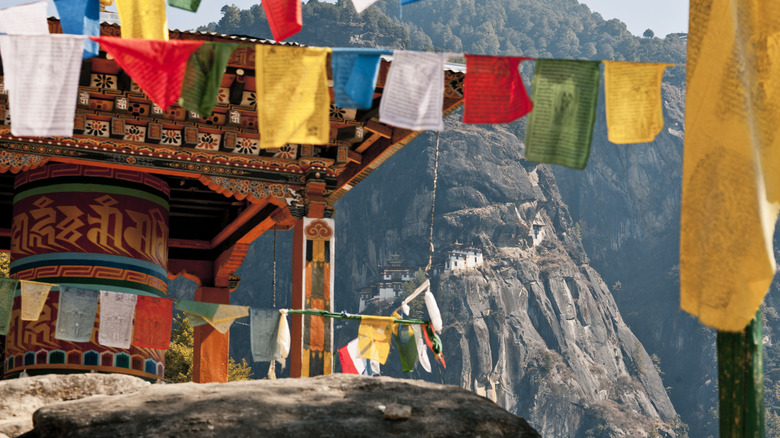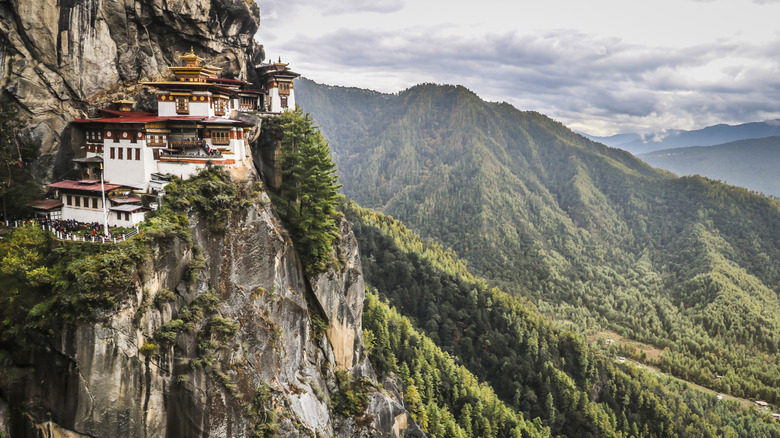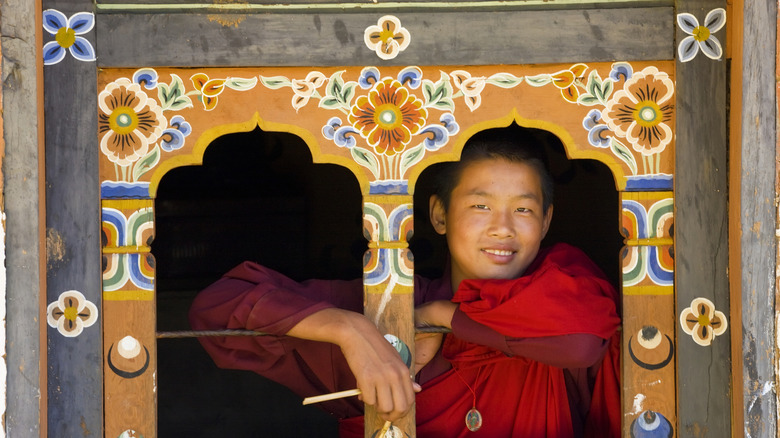The World's Last Buddhist Kingdom Is A Mountainous Gem Of Golden Temples
Due to it's diminutive size, hard-to-reach location (its main international airport has one of the most challenging runways in the world), and cautious approach to tourism, Bhutan remains an underrated tourist destination to visit in Asia. Yet, as it slowly opens its doors to more visitors, it's gaining more recognition. Tourists come home from Bhutan singing its praises, in awe of the unspoiled nature, friendly people, and thriving culture.
So, what's it like visiting the last Buddhist kingdom on Earth? Despite improvements to the tourism sector, it's not easy to visit Bhutan — nor is it cheap. With the highest travel levy in the world, at around $100 per day (per person!), many find the cost too prohibitive. And until 2022, you could only visit with a guide or on a tour, although that rule has now changed. However, Bhutan's Department of Tourism says, "A local guide will help you see the best that the country has to offer and will ensure your safety when exploring unfamiliar terrain and altitude."
As you can see, Bhutan is a complex (and expensive) place to visit. Despite these barriers, Bhutan remains a coveted destination for many travelers. The sky-high temples and monasteries clinging to rocky peaks feel otherworldly, and the prayer flags, royal family, and rural life seem from a bygone era. It's such a wholly unique destination that there are a few things to know before you go.
Travel tips and highlights of Bhutan
Visitors to Bhutan, or Druk Yul, the "Land of the Thunder Dragon," need a tourist visa (around $40) in addition to the $100/day Sustainable Development Fee. (It's only $50 for kids between the ages of six and 12, and free for kids five and under). Apply for the visa ahead of time on Bhutan's immigration website. It's also strongly recommended (although no longer mandatory, as of April 2024) that you purchase travel insurance for your trip. To make your trip to Bhutan go smoothly, carry small change to use as donations at monasteries and cash when shopping at a local market — it's helpful to know that bargaining isn't common here. Be sure to pack layers suitable for Himalayan weather, keep an open mind when learning about the local culture, and whatever you do, don't drink the tap water!
Bhutan is well known for its deep valleys, mountain peaks, and stunning temples, especially the iconic Tiger's Nest Monastery. The Tiger's Nest (or Paro Takstang), a picturesque collection of buildings perched on a cliff overlooking the Paro Valley, is one of the world's best places to put on your travel bucket list. Like Bhutan itself, it's not easy to reach, as it requires a moderate 4-mile (6.4 km) trek along steep mountain trails to an elevation of 10,232 feet. Experts recommend you visit near the end of your trip in order for your body to fully acclimate to the altitude before you attempt the trek.
Other highlights of Bhutan are the many golden temples, some of which are guarded by colorful, fluttering prayer flags. When visiting temples and monasteries, be respectful by removing shoes and hats, wearing conservative clothing (covering shoulders and knees!), and considering a donation.
Bhutan's Gross National Happiness: a model for sustainable tourism
The friendly, polite, and happy people of Bhutan are another major draw to visitors. The government has a unique Gross National Happiness (GNH) index, inspired by the Buddhist principle of balance, or the "middle way." According to the country's GNH Centre, it's officially defined as a "multidimensional development approach seeking to achieve a harmonious balance between material well-being and the spiritual, emotional and cultural needs of society."
In a world that seems ruled by the almighty dollar, it's refreshing for a country to prioritize its citizens' well-being. Bhutan's GNH focuses on four pillars: good governance, sustainable socioeconomic development, preservation and promotion of culture, and environmental conservation. In recent years, however, the GNH has come under criticism, as certain questions regarding poverty levels, human rights violations, and freedom of speech have come into play. On the Reddit thread r/howisitlivingthere, one user explains what it's like to live in Bhutan: "For an average family, life is simple without much of a problem ... 'Happiness Country' serves as a label to promote the tourism sector, which largely helps the economy. We have our own dark truths to deal with, but who doesn't. It's not even true nor false. We just have to see it from a different view to understand it."
Despite the valid questions surrounding the GNH, Bhutan is still considered a model of sustainable tourism around the globe. With 2024 expected to be the worst year ever for overtourism, more and more countries are looking for ways to mitigate its impacts, such as pollution, damaged infrastructure, and overcrowding. Bhutan, as the world's first carbon-negative country, could give us a blueprint for creating a greener and happier world.


